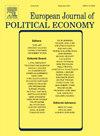Social media campaigning and voter behavior–evidence for the German federal election 2021
IF 2.4
3区 经济学
Q2 ECONOMICS
引用次数: 0
Abstract
We analyze the relationship between party campaigning on social media and the voting intentions voiced by respondents in a large representative survey in the German federal election campaign in 2021. We argue that online campaigns spread through the online and offline networks of the initial recipients – thereby influencing substantial parts of the electorate. We exploit inter-temporal, inter-regional, and inter-party differences in the intensity of campaigning by parties and candidates on Facebook and Twitter. In addition, we control for the respondents' choice in the previous federal election and a number of other personal characteristics. Using a multinomial logit model with alternative-specific constants, we find the probability of a respondent's intention to vote for a party to increase in the state-specific campaigning activities on social media of this party the days before. While the literature suggests that especially populist right-wing parties will benefit from campaigning on social media, we find the marginal impact to be significantly higher for Christian democrats, Social Democrats, and Greens than for the right-wing “Alternative für Deutschland”.
社交媒体活动和选民行为——2021年德国联邦选举的证据
我们分析了政党在社交媒体上的竞选活动与受访者在2021年德国联邦选举活动中所表达的投票意向之间的关系。我们认为,在线竞选活动通过最初接受者的线上和线下网络传播——从而影响了相当大一部分选民。我们利用政党和候选人在Facebook和Twitter上的竞选强度的跨时间、跨地区和跨党派差异。此外,我们还控制了受访者在之前的联邦选举中的选择以及其他一些个人特征。我们使用具有特定选择常数的多项logit模型,发现受访者在前几天在该政党的社交媒体上特定州的竞选活动中投票给该政党的意图增加的概率。虽然文献表明,尤其是民粹主义右翼政党将从社交媒体上的竞选活动中受益,但我们发现,基督教民主党、社会民主党和绿党的边际影响明显高于右翼的“德国新选择党”。
本文章由计算机程序翻译,如有差异,请以英文原文为准。
求助全文
约1分钟内获得全文
求助全文
来源期刊

European Journal of Political Economy
Multiple-
CiteScore
3.40
自引率
10.00%
发文量
106
期刊介绍:
The aim of the European Journal of Political Economy is to disseminate original theoretical and empirical research on economic phenomena within a scope that encompasses collective decision making, political behavior, and the role of institutions. Contributions are invited from the international community of researchers. Manuscripts must be published in English. Starting 2008, the European Journal of Political Economy is indexed in the Social Sciences Citation Index published by Thomson Scientific (formerly ISI).
 求助内容:
求助内容: 应助结果提醒方式:
应助结果提醒方式:


